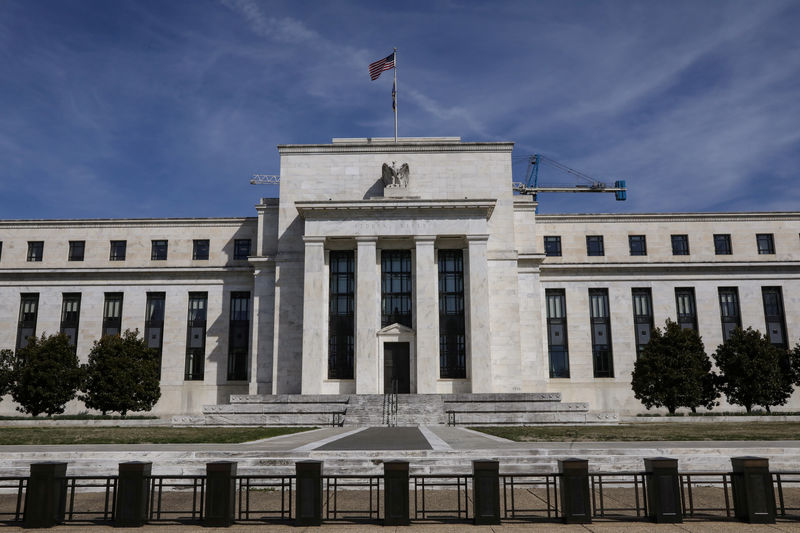By Saqib Iqbal Ahmed
NEW YORK (Reuters) - The Federal Reserve's pivot on tightening U.S. monetary policy this year and a change in a bond market gauge that is often viewed as a harbinger of a recession pose a dilemma for investors: how to stay in stocks without running the risk of losing one's shirt when risk assets stumble.
Alternative mutual funds that use options to maintain exposure to stocks even as they tamp down volatility could provide the buffer between mild gains and massive losses.
"We definitely think now is a good time to be looking at strategies that can both participate in market advances and reliably deliver protection," said David Jilek, chief investment strategist at Gateway Investment Advisers in Boston.
The $8.27 billion Gateway Fund - the oldest and largest fund in Morningstar's options-based category - has a three-decade history of running low-volatility equity index options strategies.
The fund, which marries stock ownership with index call and put options hedges, aims to capture a portion of equity market returns but with less volatility.
In the fourth quarter when the S&P 500 Total Return index tanked 13.52%, the fund's Y class shares fell only 7.47%. On the flip side, when stocks rebounded 13.65% in the first quarter, the fund's shares only gained 5.01%.
Like any investment, gaining protection from volatility carries risk. Over the longterm, investors may miss out on big gains by opting for nearterm protection from huge losses.
For instance, an investment of $10,000 in the Gateway fund 10 years ago would now be worth about $17,500, according to Refinitiv data. By comparison, the same amount invested in the S&P 500 Index's tracking fund, the SPDR S&P 500 ETF Trust (AX:SPY), would have returned more than $44,000, albeit with a higher degree of volatility.
"Investors would be better off just putting their money in passive funds," said Mark Hebner, president of Irvine, California-based independent financial adviser Index Funds Advisors.
Equity markets have enjoyed a period of very low volatility and strong returns over the last decade, but that may be set to change.
Stocks tumbled hard late last year, as investors fretted over mounting concerns about global growth, waning corporate profits, U.S.-China trade tensions and the Fed's path on rate hikes.
Even though most of those losses have been recouped, jitters remain, with some worrying that the Fed's dovish tilt is an implicit confirmation of the markets’ anxiety about growth.
The recent inversion of the yield curve -- the yield on the 10-year U.S. Treasury bond slipped below 3-month T-bill rates for the first time in more than a decade - is considered a classic signal that a recession may follow in the next one to two years.
"I think there are a lot of advisers who are looking for that downside protection, but they don't want to bet against the market and they don't want to be overallocated to bonds. Our strategy fits that need pretty well," Jilek said.
GRAPHIC: Gateway fund performance, click https://tmsnrt.rs/2VcjmDs
ROCKY PATH AHEAD
Notwithstanding worries about an approaching recession, quitting stocks altogether may prove expensive.
"Historically, equity markets tended to produce some of the strongest returns in the months and quarters following an inversion," J.P. Morgan strategist Marko Kolanovic said in a recent note.
But it might not be all smooth sailing.
"The last three years of the '90s bull market were very profitable but very volatile," said Eli Pars, co-chief investment officer at fund manager Calamos Investments in Chicago. "We may be looking at a period like that again."
Pars leads strategy for the Calamos Hedged Equity Income Fund, which uses a covered call strategy - selling call options against a portfolio of equities - while using puts to limit downside.
"It's geared toward investors that may be a little less comfortable - either because where we are in the cycle or just in general - with full-on exposure to the equity market," Pars said.
For 2018 fourth quarter, the fund fell 6.32%, compared with a drop of 13.52% for the S&P 500 Total Return index, according to Morningstar data. In the 2019 first quarter, the fund's shares gained 6.38%, compared with a 13.65% gain for stocks.
The fund, a relatively new spinoff from the $6 billion Calamos Market Neutral Income Fund, has gone from managing $10 million to $160 million over the last 18 months, Pars said.
This story corrects in 8th paragraph, corrects data source to Refinitiv from Thomson Reuters in 1st sentence, and deletes repeated words in 2nd sentence
